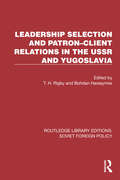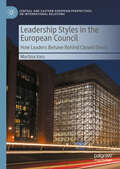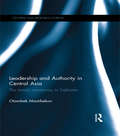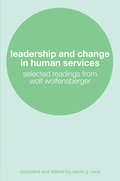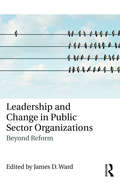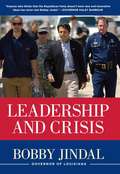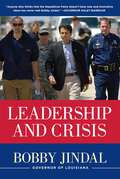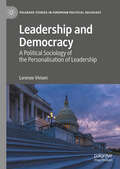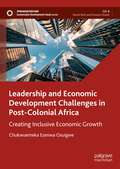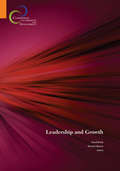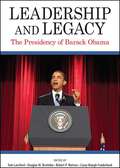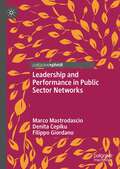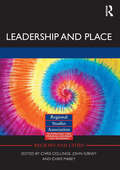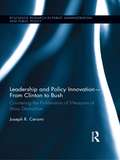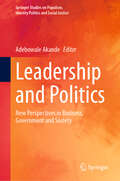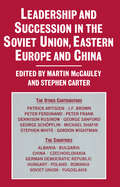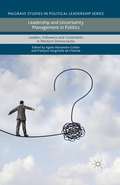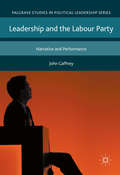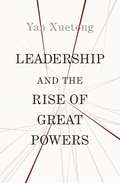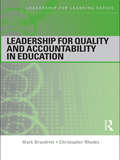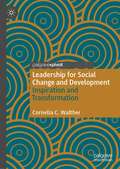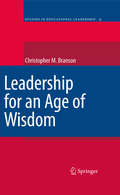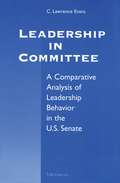- Table View
- List View
Leadership Selection and Patron–Client Relations in the USSR and Yugoslavia (Routledge Library Editions: Soviet Foreign Policy #9)
by Rigby T. H. Harasymiw BohdanLeadership Selection and Patron-Client Relations in the USSR and Yugoslavia (1983) examines the system of nomenklatura, the semi-secret network of quasi-bureaucratic rules and personal relationships through which careers in Soviet politics were managed. Other Communist countries took the USSR as their prototype and their patronage relationship systems are included in this study.
Leadership Styles in the European Council: How Leaders Behave Behind Closed Doors (Central and Eastern European Perspectives on International Relations)
by Martina VassUsing the example of Werner Faymann, Dalia Grybauskaité, Angela Merkel, Viktor Orbán and Mark Rutte, the book examines the impact that the European Council’s environment has on leadership styles and the impact of leaders on the institution’s decision-making during the financial and debt crisis, the Ukraine crisis, and the migration crisis (2010-2016). It presents domestic factors affecting the choice of leadership style nationally, finding cooperative styles are best suited to the European Council, as its structure relies on negotiated consensus. The European Council’s environment has three effects on leadership styles and decision-making: socialisation towards cooperation, compromise making, and Europeanisation. The book provides an in-depth insight into how leaders behave among their peers behind closed doors.
Leadership and Authority in Central Asia: The Ismaili Community in Tajikistan (Central Asia Research Forum)
by Otambek MastibekovThis book explores the unfolding of world history in a remote corner of Central Asia: the region of Badakhshan. The history of this region has commonly been explored through the lens of the major superpowers who competed over its territory in the nineteenth and twentieth centuries, including Britain, Russia, and China. Here, we are offered a comprehensive overview of the history of the Ismaili community in Tajikistan. Leadership and Authority in Central Asia identifies traditional forms of religious authority within the network of religious functionaries at a range of levels and discusses the functions of Ismaili political leaders as they have evolved through time. Skilfully applying an interdisciplinary approach – drawing on historical sources, including unpublished materials, and ethnographic fieldwork data collected through interviews – and a perceptive analysis of political theories of leadership in communist and post-communist societies, this book challenges the ways religious and secular categories have been distinguished in recent scholarship Developing a structural explanation for the survival and evolution of religious and political authorities of Badakhshani Ismailis in times of radical social and political upheaval, this book will be of interest to scholars of Muslim societies, Political Science and Central Asian Studies.
Leadership and Change in Human Services: Selected Readings from Wolf Wolfensberger
by David G. RaceFor over forty years Wolf Wolfensberger has been a significant figure in the world of human services, especially in the field of learning disability. His work on normalization and citizen advocacy in the late 1960s and early 1970s has been acknowledged by supporters and critics alike to have been fundamental to developments in a number of countries, most notably his adopted country, and the USA, Canada, Australasia, and the UK. His further work in developing the theory of social role valorization, the successor to normalisation, and as a commentator on broader trends in society and their effects on vulnerable people and services for them has ensured his place as a major voice for values and the human worth of all people. Never afraid of controversy, his views have brought him into conflict with institutional vested interests and radical groups alike.In Leadership and Change in Human Services David Race introduces the reader to Wolfensberger's key ideas through a series of extracts, with commentary, from his published work. Throughout the edited selection, the emphasis is on placing Wolfensburger's work in contemporary context and examining its continuing relevance today. Including a comprehensive bibliography of Wolfensburger's written output, this text offers an invaluable source of reference to all those concerned with the recent history of the human services.
Leadership and Change in Public Sector Organizations: Beyond Reform
by James D. WardSuccessful change in the public sector can be supported or hindered by political and administrative leadership, individual and group motivation, and the public’s perception of the effectiveness of public officials and government structures. But do the very characteristics of public sector organizations present obstacles to successful transformative change? This book assesses the current state of the literature on leadership and change in government and public policy, and introduces the reader to innovative new ways to demonstrate leadership in times of change. Contributions from accomplished scholars in the field cover the traditional public administration areas of performance and management, as well as the diversity of issues that surround public leadership and change, both domestic and global. Chapters on public sector innovation, performance leadership, governance networks, complexity in disaster management, change initiatives in educational systems and local government, citizen advisory bodies, and gender and race equality, to name but a few, provide important case studies throughout the volume. Leadership and Change in Public Sector Organizations will be required reading for upper level undergraduate and graduate courses in public administration/management, leadership, and public policy analysis.
Leadership and Crisis
by Bobby JindalTested by Fire. Bobby Jindal has been tested as few politicians have. And from the Deepwater Horizon oil disaster to Hurricane Katrina, he's shown an astounding ability to beat the odds (and beat the bureaucrats) to get things done. Then again, Jindal is not your typical politician. The son of Indian immigrants, a Christian convert from Hinduism, and a Rhodes Scholar, Jindal presided over Louisiana's healthcare system at age 24, headed the University of Louisiana system at 27, became a U. S. congressman at 33, and was elected governor of Louisiana at 36. Throughout his meteoric career, Jindal has dealt with some of the worst crises of our times, from natural disasters in his home state to out-of-control spending in Washington, D. C. His secret: the common sense solutions that bureaucrats (and politicians) ignore in favor of government-as-usual. In Leadership and Crisis, Jindal reveals: How the Obama administration spent too much time worrying about public perception and not enough on actually fighting the oil; How the federal government actually impeded Louisiana's efforts to stem the flood of oil; Why the bureaucratic incompetence during Hurricane Katrina was even worse than you know; How Bobby Jindal took on Louisiana's infamous culture of corruption; His own journey from Hinduism to Christianity, from student at Oxford to Governor of Louisiana, from policy wonk to instant midwife when he had to deliver his third child himself. Filled with behind-the-scenes stories from the oil-slicked beaches of Louisiana to the corridors of power in the U.S. Capitol, Leadership and Crisis offers an insider's view into one of the worst environmental disasters our nation has suffered--and into one of the most unique success stories of American politics.
Leadership and Crisis
by Bobby JindalFrom day one of the BP oil spill, Louisiana Governor Bobby Jindal acted as a leader in a crisis should: quickly and decisively-providing a stark contrast to President Obama, who dithered and bogged down the containment process with needless bureaucracy. In his new book, Leadership in Crisis, Jindal reveals the extent of the Obama administration's incompetence during the oil spill, and shows why common sense conservative solutions are exactly what we need to solve all of our nation's biggest problems. Tackling everything from Obamacare and the economy to environmental and energy issues, Jindal presents his own solutions to today's most pressing problems-and proves why the principles of limited government and conservative leadership are the key to getting America back on her feet. Blending Jindal's unique personal story with the current events of today, Leadership in Crisis reminds us how a true leader should act and reveals how we can restore America to greatness through the timeless principles put forth by our Founding Fathers and the Constitution.
Leadership and Democracy: A Political Sociology of the Personalisation of Leadership (Palgrave Studies in European Political Sociology)
by Lorenzo VivianiThis book analyses political leadership, addressing key questions central to the ongoing debate on the transformation of contemporary democracies. What exactly is political leadership? How does the relationship between leadership and power shape democratic transformations? What role do individuals play in broader historical processes? How does the personalisation of politics manifest, and how does it differ between leader democracy and populism? Is there still room for charismatic leadership in modern democracies and societies? These are some of the critical questions explored in this volume. The book traces the sociological relationship between leadership and power from foundational theories in the social sciences, through the personalisation of politics, to the rise of leader democracy and populist leadership. This book will be of interest to scholars, students, and practitioners in the fields of political sociology, political science, and leadership studies, as well as anyone engaged in understanding the evolving dynamics of leadership in contemporary democracies.
Leadership and Economic Development Challenges in Post-Colonial Africa: Creating Inclusive Economic Growth (Sustainable Development Goals Series)
by Chukwuemeka Ezenwa OsuigweThis book explores the economic and development challenges seen within post-colonial Africa. Particular attention is given to governance and political leadership challenges within Africa and how they have resulted in poor education facilities, a lack of infrastructure development, corruption, and economic insecurity. The ways in which Africa’s natural resources and agricultural land have not been utilised to drive development and economic growth are examined in relation to internal political conflicts. Broader issues, such as labour exploitation, financial leakage, and the exclusion of women from decision making, are also discussed. This book highlights poor political leadership within Africa and presents a framework for inclusive economic growth within post-colonial Africa. It will be of interest to students, researchers, policymakers and leaders working with development of African economics.
Leadership and Growth
by Michael Spence David BradyDoes leadership affect economic growth and development? Is leadership an exogenous determinant or an endogenous outcome of growth and development processes? Can we differentiate between the two? Do leaders' decisions and actions vary in importance over various stages in the process, at least in successful cases? How important is choosing the right economic model? To what extent does leadership affect the explicit or implicit time horizons of policy choices? Is leadership an important determinant of inclusiveness in growth? In what ways do leaders build consensus or institutions to allow time for the economic plan to work? What challenges does economic success generate? How do successful leaders adapt to new problems such as income inequality and a rising middle class? Does the creation of new institutions play any role in solving these problems? Why do leaders often choose second best political economic compromises in economic development? This book has been prepared for the Commission on Growth and Development to evaluate the state of knowledge on the relationship between leadership and economic growth. It does not pretend to provide all the answers, but does review the evidence, identify insights and offers examples of leaders making decisions and acting in ways that enhance economic growth. It examines a variety of topics including leaders' roles in: promoting national unity, building good solid institutions, choosing innovative and localized policies, and creating political consensus for long run policy implementation. Written by prominent academics and actual policy makers, Leadership and Growth seeks to create a better understanding of the role of leadership in growth and to encourage further studies of the role of leadership in economic growth.
Leadership and Legacy: The Presidency of Barack Obama (SUNY series on the Presidency: Contemporary Issues)
by Tom Lansford; Douglas M. Brattebo; Robert P. Watson; Casey Maugh FunderburkHistoric, intriguing, and important in so many ways, the Obama presidency will be studied by scholars and students for years to come. With the rise in hyperpartisanship, legislative gridlock, political dysfunction, "fake news," and other negative trends, it is imperative that academicians weigh in with a rigorous assessment of Obama's presidency. This volume applies a variety of scholarly approaches to analyze the impact of Obama as a leader and policymaker. Scholars from disciplines such as political science, history, environmental science, economics, and communication come together to provide an interdisciplinary and wide-ranging appraisal of the president. Across the varied chapters, Obama's leadership is central to understanding the success or failure of his policies and initiatives. The president's decisions and actions are also assessed against the constraints and possibilities created by the modern US political system, rapid changes in technology and society, and shifting patterns in international relations. The result is a book that covers executive leadership, administration, domestic issues, foreign and national security policy, and more, to present a comprehensive review of the Obama legacy.
Leadership and Performance in Public Sector Networks
by Denita Cepiku Marco Mastrodascio Filippo GiordanoThis book analyses two key aspects of network management in the public sector: leadership and performance. It investigates what integrative leadership is, and how it differentiates from leadership in single-agency structures. It also examines the performance of public interest networks by proposing an analytical framework that highlights which factors lead to high performance networks. This book is of interest to scholars and students of public management and public administration, as well as public managers and practitioners acting through networks and partnerships.
Leadership and Place (Regions And Cities Ser.)
by John Gibney Chris Mabey Chris CollingeDespite the radical transformation of society associated with globalisation, shifting patterns of demography and the revolution in information and communication technologies over the last two decades, we remain profoundly attached to place in economic, social, cultural and emotional terms. The idea of sustainable place shaping has made its way to the heart of the debate on the form and delivery of integrated (economic development, planning, housing, regeneration, education, transport and health) policy for our neighbourhoods, towns, cities and regions. The delivery of policy for place shaping has become a far more complex cross-boundary and relational leadership task - and there is now a requirement for a refreshed approach to leadership development for collaborative learning and ‘associational’ working. Going forward, what is needed is a more insightful and comprehensive conceptual framework related to the leadership of place that takes account of the paradigm shift occurring in economic development, planning and regeneration studies. Against this background, this timely book takes stock of the leadership literature and connects with the experience and views of those working in economic development, planning and regeneration. In this book we seek to enhance the discussion of these new leadership challenges. This collection first appeared as a special issue of Policy Studies and is now published by kind permission in the Regional Studies Association book series, Regions and Cities.
Leadership and Policy Innovation - From Clinton to Bush: Countering the Proliferation of Weapons of Mass Destruction (Routledge Research in Public Administration and Public Policy)
by Joseph R. CeramiThroughout the Cold War there were longstanding efforts to control the spread of Weapons of Mass Destruction (WMD) through extensive arms control, deterrence, and defense programs. Since then counterproliferation efforts by the U.S. and international community have accelerated. Given the attention to counterproliferation in the last decade, how effective was the leadership provided by President Clinton and his Secretaries of Defense, Aspin, Perry and Cohen, in providing innovative and effective policies for countering the proliferation of WMD? Comparing the cases of U.S.-North Korea Agreed Framework, the Nunn-Lugar Cooperative Threat Reduction Program and U.S. and U.N. efforts in Iraq under Saddam Hussein, Joseph R. Cerami examines patterns of organizational leadership and policy innovation in the development and implementation of WMD policy initiatives. Rather than criticize the framework of American and international political institutions, this leadership perspective draws important insights on the capabilities of institutions to further U.S. and international goals and objectives in security policymaking. In doing so, the book argues that the U.S.’s role and the roles of its internal government agencies are most significant in international affairs. Smartly and appealingly positioned at the intersection of theory and practice, Cerami’s book crafts a new perspective in international relations and public administration offering great potential for understanding as well as designing policy innovations to counter the proliferation of WMD in the 21st century.
Leadership and Politics: New Perspectives in Business, Government and Society (Springer Studies on Populism, Identity Politics and Social Justice)
by Adebowale AkandeThis volume sheds light on the world of organizational politics, political leadership, and the pivotal roles played by employees and political leaders in managing diverse groups. It picks up where influential scholars like Edgar Schein, Harry Triandis, Bernard Bass, Robert House, Shalom Schwartz, and Geert Hofstede left off, providing a timely and transparent exploration of these crucial topics. In a rapidly evolving landscape, characterized by renewed interest in political skill, people management, leadership and management, diversity training, organizational culture, workplace incivility, ambivalence alliance, and career development, the book emerges as an invaluable resource, assembling a group of renowned contributors in the field, who have conducted extensive social research. It offers a comprehensive view of contemporary organizational politics, psychology at work, DEI, political skill/will, HRM, leadership effectiveness, organizational behavior and culture, relationships in the workplace and emotions in politics, favoritism, workplace incivility, ambivalent alliance, people analytics, and office politics, and competition. The book discusses the ongoing struggle between knowledge-driven scholarship and dogmatic ideology in the workplace and beyond. As organizations grapple with the challenges of today's business environment, the book therefore is an indispensable guide for scholars, consultants, and leaders committed to driving continuous improvement and navigating the complex intersection of politics and leadership in the modern workplace.
Leadership and Succession in the Soviet Union, Eastern Europe, and China (Studies In Russia And East Europe Ser.)
by CarterFirst Published in 1986. Routledge is an imprint of Taylor & Francis, an Informa company
Leadership and Uncertainty Management in Politics: Leaders, Followers and Constraints in Western Democracies (Palgrave Studies in Political Leadership)
by François Vergniolle De ChantalThrough a range of international case studies from the USA, UK, France, Germany and Italy, this text assesses the conditions necessary for effective leadership and emphasizes the part played by uncertainty and division amongst followers.
Leadership and the Labour Party: Narrative and Performance (Palgrave Studies in Political Leadership)
by John GaffneyThe relationships between narrative and leadership, between rhetoric and performance, between doctrine and its voicing, are crucial to party politics and are underrated by both practising politicians and scholars. This study analyses the ‘performance of leadership’ in the UK Labour Party, and what this means for a new approach to understanding politics. The main focus of this study is the five-year leadership of Ed Miliband, 2010-2015. The fortunes of the party and the party leadership can be apprehended as a series of performed rhetorical events. A political leader’s persona is a construction that performs – rather like an actor – in the political space. The author identifies and analyses the architecture and the modalities of leadership persona construction and performance in contemporary politics.
Leadership and the Rise of Great Powers (The Princeton-China Series #11)
by Xuetong YanA leading foreign policy thinker uses Chinese political theory to explain why some powers rise as others decline and what this means for the international orderWhile work in international relations has closely examined the decline of great powers, not much attention has been paid to the question of their rise. The upward trajectory of China is a particularly puzzling case. How has it grown increasingly important in the world arena while lagging behind the United States and its allies across certain sectors? Borrowing ideas of political determinism from ancient Chinese philosophers, Leadership and the Rise of Great Powers explains China’s expanding influence by presenting a moral-realist theory that attributes the rise and fall of nations to political leadership. Yan Xuetong shows that the stronger a rising state’s political leadership, the more likely it is to displace a prevailing state in the international system.Yan defines political leadership through the lens of morality, specifically the ability of a government to fulfill its domestic responsibility and maintain international strategic credibility. Examining leadership at the personal, national, and international levels, Yan shows how rising states like China transform the international order by reshaping power distribution and norms. Yan also considers the reasons for America’s diminishing international stature even as its economy, education system, military, political institutions, and technology hold steady. The polarization of China and the United States will not result in another Cold War scenario, but their mutual distrust will ultimately drive the world center from Europe to East Asia.Using the lens of classical Chinese political theory, Leadership and the Rise of Great Powers offers a provocative, alternative perspective on the changing dominance of nations on the global stage.
Leadership for Quality and Accountability in Education (Leadership for Learning Series)
by Christopher Rhodes Mark BrundrettThe study of educational leadership makes little sense unless it is in relation to who the leaders are, how they are leading, what is being led and with what effect. Based on the premise that learning is at the heart of leadership and that leaders themselves should be learners, the Leadership for Learning series explores the connections between educational leadership, policy, curriculum, human resources, and accountability. Each book in the series approaches its subject matter through a three-fold structure of process, themes and impact. Series Editors - Clive Dimmock, Mark Brundrett and Les Bell What is the role of leadership in developing strategies that enhance learning outcomes? Leadership for Quality and Accountability in Education addresses the interconnected issues of quality and accountability in the education system and provides a coherent framework within which these issues can be analysed. The authors outline the significance of promoting quality in all educational establishments and go on to discuss why quality and accountability have become so essential to the framework of leadership in education, how quality and accountability have been utilised on a national and international scale and what the defining characteristics of these terms are. The book is divided into three sections which explore three linked key aspects: Part I focuses on the concept and nature of quality and accountability and the process of developing a culture of quality; Part II addresses the issues of managing staff and resources, leadership for high-quality teaching and learning and relationships with stakeholders; Part III considers the impact and prospect of quality and accountability, including internal evaluation and external inspection. The book will appeal to educational leaders and managers, advisors and inspectors, and academic researchers. It will also be of particular relevance to Masters and doctoral degree students specialising in school leadership and management.
Leadership for Social Change and Development: Inspiration and Transformation
by Cornelia C. WaltherThe book offers perspectives from change makers. It is intended to inspire readers to get involved in the pursuit of social transformation. The objective of is to make the causes and consequences, and the added value, of inclusive social change tangible. Using real life stories that draw on the power of the human being to inspire by example, BeingChange shows that ‘purpose for power’ is not a platitude, but a principle that favors both subjective wellbeing and social progress. The selected of formal and informal agents of change show why meaning is the undercurrent of genuine empowerment, and the main ingredient of sustainable development. The goal in sharing these stories is twofold, 1) Illustrate that no matter WHO and WHERE you are, and what you have, it is possible to align your life-long aspirations and every-day actions, and 2) Inspire readers to get started (or accelerate) their quest for purpose by identifying and pursuing what matters most to them. A network of likeminded thinkers and doers, connected by the shared belief that the World must not be accepted as a given, is growing around the world. Everyone is welcome to shift their perspective from passive to active and join.
Leadership for Social Justice in Higher Education
by Terance W. Bigalke Mary S. ZurbuchenThis book provides a wealth of comparative information on social justice in higher education worldwide by examining how the Ford Foundation International Fellowships Program, the world's largest private fellowship program in higher education, has succeeded in fostering social justice leadership over the past ten years.
Leadership for an Age of Wisdom
by Chris BransonThis book provides a clear, comprehensive, and compelling description of the nature, characteristics, and prerequisites of wisdom-led leadership. It not only includes a detailed description of what is meant by wisdom-led leadership but also it describes how wisdom-led leadership can be developed based on current research data. In other words, practical ways to promote wisdom-led leadership are described. In addition, a metaphysical foundation in support of wisdom-led leadership is provided along with a detailed analysis of how this form of leadership can better prepare the leader to confidently and capably attend to their relational and organisational development demands, which are pivotal to their success. Finally, the fundamentally important and influential external issues of performance management, vision, goals, and accountability are discussed at length with respect to their potentially detrimental impact on the achievement of wisdom-led leadership. Embracing wisdom-led leadership does not mean that we have to forgo what performance management, vision, goals, and accountability procedures seek to achieve. It just means that these desired outcomes need to be achieved differently.
Leadership for the Future Sustainable Development of Business and Education: 2017 Prague Institute For Qualification Enhancement (prizk) And International Research Centre (irc) Scientific Cooperation International Conference (Springer Proceedings In Business And Economics)
by Wadim Strielkowski Oksana ChigishevaThis proceedings volume examines leadership from the perspectives of business, economics, social sciences, cross-cultural management, and education as a means to establish a future of sustainable development. Featuring contributions from the 2017 Prague Institute for Qualification Enhancement (PRIZK) and International Research Centre (IRC) “Scientific Cooperation” International Conference held in the Czech Republic, this volume focuses particularly on business models and higher education schemes from BRICS nations and examines topics such as social and educational practices, academic policies and business development. Leadership is becoming a key element for the future sustainable development of business and education in the quickly globalizing world. In this regard, a special emphasis should be made on the formation of high-quality human resources—the leading experts in their field who will create innovations and introduce breakthrough technologies. The development of a creative economy and knowledge economy requires highly-educated human capital, thus education becomes a key element of this process. Education must keep pace with time, be competitive, and stay in touch with the process of technology. The enclosed papers identify the key steps for sustainable growth and development in business and education. Featuring contributions on theory and practice, this book is appropriate for academics, researchers, policy-makers and practitioners in the areas of business, leadership management, entrepreneurship, innovation and education.
Leadership in Committee
by C. Lawrence EvansCompares the leadership styles of eight committee chairs and ranking minority members of the Senate. Based on interviews with senators and staff, details their various (admitted) behavior, tactics, and effectiveness.
